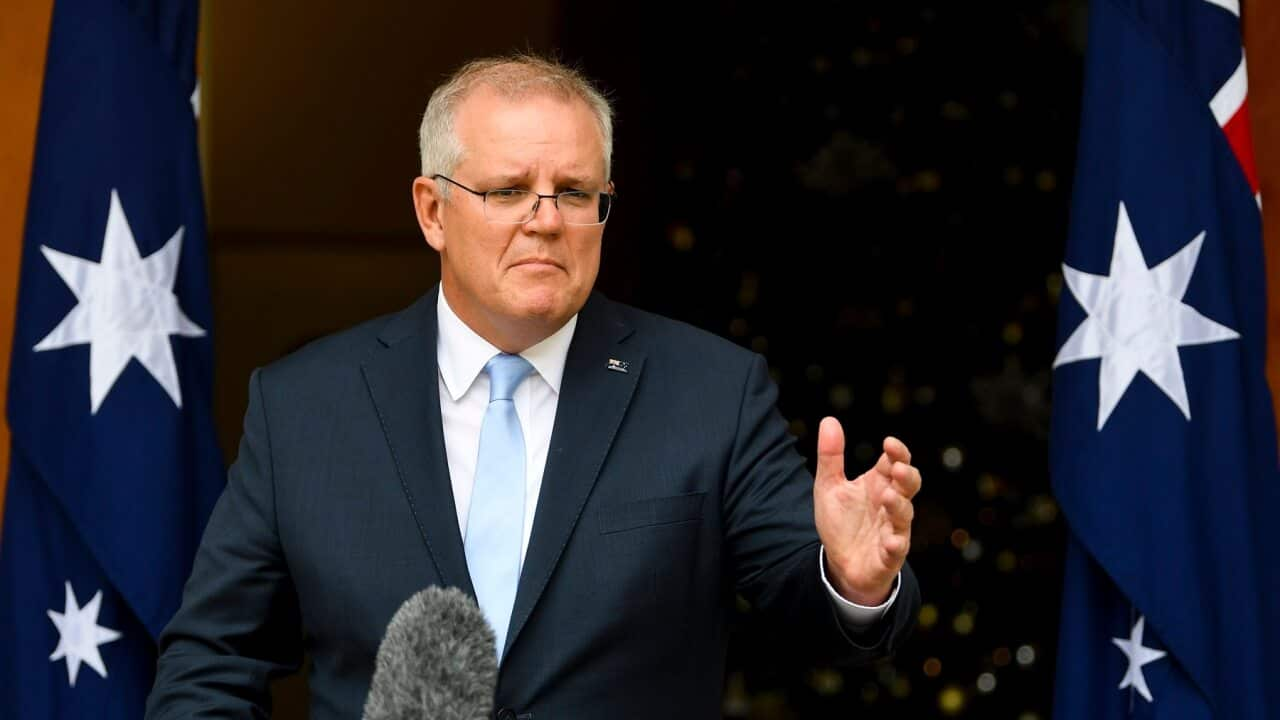A federal government credit agency has spent about 80 times more money on fossil fuel projects than renewables over the past 11 years, new research estimates.
Analysis by research non-profit Jubilee Australia found Export Finance Australia (EFA) provided up to $1.69 billion in financing to the fossil fuel sector and related services - including for coal, oil and gas - compared to just $20 million for renewable energy projects between 2009 and 2020.
The research trawled through EFA annual reports and transaction registers to identify the types of projects it had been backing.
Jubilee Australia executive director Luke Fletcher said the disparity of financing between fossil fuel projects and renewable energy highlighted a concerning trend.
“The amount of financing for fossil fuels dwarfs the amount that is going into renewables so EFA is really not investing in renewables and that’s a huge problem,” Mr Fletcher told SBS News.
EFA is the federal government’s export credit agency that finances Australian exporting companies and their potential buyers, including overseas projects.
It is self-funded, operates on a commercial basis, and has an independent board, and while its financing activities are guaranteed by the Australian government, it has not yet been required.
EFA is exempt from most freedom of information laws, meaning the full extent of all its transactions is largely protected from public scrutiny.
What projects did EFA fund?
Among the fossil fuel projects financed by EFA include the Wiggins Island Coal Export Terminal and Santos’ Gladstone LNG project in Queensland, and the Ichthys LNG project off the West Australian coast, according to the research.
In 2011/2012, EFA contributed $94.2 million towards the Wiggins Island project and gave a $254.7 million loan to Santos for the Gladstone LNG project.
In 2012/2013, EFA put a $142.33 million loan towards the Ichthys LNG project.
It also provided a loan of $383.4 million for a Papua New Guinea liquefied natural gas project in 2009/10.
The $1.69 billion total Jubilee said was spent on fossil fuel projects includes two refinancing transactions worth $288.77 million.
They were reported in the media but not declared in annual reports or transaction registers. The non-profit said it attempted to corroborate the reported information with EFA but did not receive a response.
In a statement, Trade Minister Dan Tehan said decisions about what projects are funded via the EFA are based on independent assessment and are subject to board oversight and decision.
“EFA assesses all transactions on a case-by-case basis and does not favour certain types of projects over others," he said.
“Between 2015-16 and 2019-20, EFA financing of all energy projects accounted for less than five per cent of the total finance provided by EFA.”
Time to 'turn off the tap'
Tony Wood, director of the energy program at the Grattan Institute thinktank, said the credit agency’s past investment in fossil fuels was not surprising given Australia’s historical export interests.
“Ten years ago there wouldn’t have been very many if any Australian companies in the renewable energy sector who were looking to export,” he told SBS News.
“[But] today you would apply a very different assessment of these projects based simply on the financial risk that you could fund something which ... becomes a stranded asset.”
Australia has long reaped the financial rewards of fossil fuel exports, which accounted for $71 billion in revenue in the last financial year alone.
Australia was the third-largest global exporter of emissions behind Russia and Saudi Arabia in 2019, according to the Australia Institute thinktank.
But as the international community pushes for stronger action on climate change, Mr Wood said fossil fuel projects must now be considered through the lens of their long-term “climate change risk”.
“There is little doubt that the direction is towards lower emissions and away from higher emissions,” he said.
“That creates I think the best pressure, which is real financial pressure, on these organisations to change the way they’ve been supporting various industries.”
In April, Germany, France, Spain, the Netherlands, Denmark, Sweden and Britain committed to harnessing public export financing as “a key driver in the fight against climate change”.
The governments in the so-called 'Export Finance for Future' coalition endorsed principles including reviewing finance for fossil fuels more broadly and assessing how to best phase that finance out.
Mr Fletcher said "the tap needs to be turned off on new fossil fuel export projects".
“We're not asking for the government to shut down all existing fossil fuel projects - what we're talking about is the building of new projects,” he said. Independent MP Zali Steggall said she feared EFA spending was becoming “out of step” with the international community.
Independent MP Zali Steggall said she feared EFA spending was becoming “out of step” with the international community.

Independent MP Zali Steggall. Source: AAP
“It is very concerning if a vast proportion of that financing capability is in fact being spent on propping up fossil fuels, which we know private money no longer wants to support or fund,” she said.
“It is time to call time on funding of fossil fuels,” she said. “We need to make a rapid transition away from fossil fuels [and] we need to invest in clean technologies.”
Countries are facing pressure to ramp up the ambition of their climate change policies ahead of a UN climate summit in Glasgow in November.
Prime Minister Scott Morrison has stated Australia is committed to reaching net-zero "as soon as possible" and preferably by 2050 through investment in green technology.
EFA was contacted for comment.













